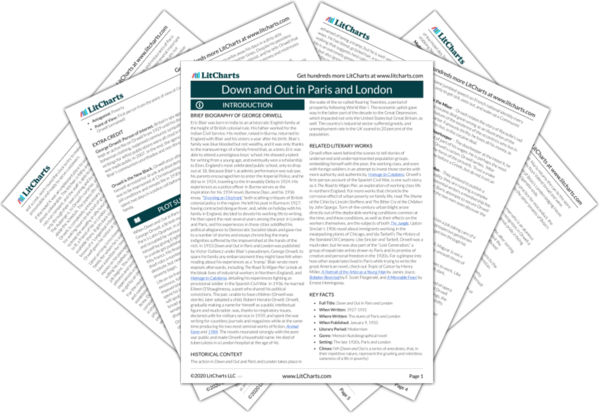Welcome to the LitCharts study guide on George Orwell's Down and Out in Paris and London. Created by the original team behind SparkNotes, LitCharts are the world's best literature guides.
Down and Out in Paris and London: Introduction
Down and Out in Paris and London: Plot Summary
Down and Out in Paris and London: Detailed Summary & Analysis
Down and Out in Paris and London: Themes
Down and Out in Paris and London: Quotes
Down and Out in Paris and London: Characters
Down and Out in Paris and London: Terms
Down and Out in Paris and London: Symbols
Down and Out in Paris and London: Theme Wheel
Brief Biography of George Orwell

Historical Context of Down and Out in Paris and London
Other Books Related to Down and Out in Paris and London
- Full Title: Down and Out in Paris and London
- When Written: 1927-1931
- Where Written: The slums of Paris and London
- When Published: January 9, 1933
- Literary Period: Modernism
- Genre: Memoir/Autobiographical novel
- Setting: The late 1920s, Paris and London
- Climax: NA (Down and Out is a series of anecdotes, that, in their repetitive nature, represent the grueling and relentless sameness of a life in poverty)
- Antagonist: Poverty
- Point of View: First person from the point of view of George Orwell (unnamed)
Extra Credit for Down and Out in Paris and London
George Orwell: Person of Interest. Britain’s spy agency, MI5, kept an active file on Orwell from 1929 until his death. Orwell’s bohemian clothing, supposed communist sympathies, and writings for leftist publications were all cited in the file, which was made public in 2007. In the end, the agency declared Blair’s communism unorthodox and non-threatening.
Orwell is the New Black. Orwell once attempted to have himself arrested for drunk and disorderly conduct. His hope was to be imprisoned at Christmastime so he might write about jail conditions and inmate life in 1930s England, but he only spent two days in a police cell before returning home to his family.












